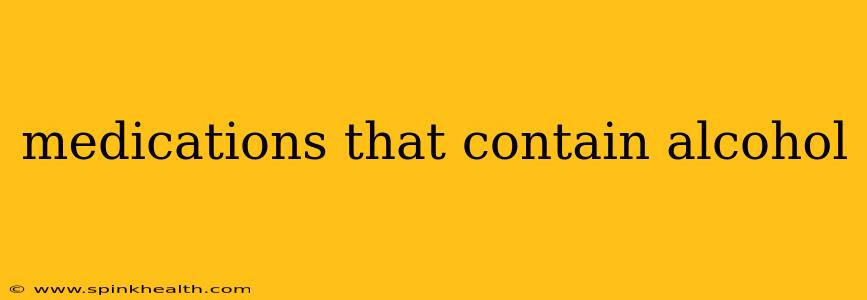Medications That Contain Alcohol: A Comprehensive Guide
Many people are surprised to learn that some medications contain alcohol. It's not always prominently advertised, and the amount can vary considerably. This can be a significant concern for individuals with alcohol sensitivities, those recovering from alcohol addiction, or anyone simply looking to avoid unnecessary alcohol consumption. This article delves into the topic, exploring which medications contain alcohol, why it's included, and what precautions you should take.
Let's begin our journey into the world of alcohol-containing medications.
What Medications Contain Alcohol?
The presence of alcohol in medications is often overlooked. It’s usually listed as "alcohol," "ethanol," or less commonly, as a specific percentage (e.g., 10% alcohol). While it's a common ingredient in many over-the-counter (OTC) medications, it's less prevalent in prescription drugs.
One common place to find alcohol is in cough syrups and cold medicines. Many liquid formulations, particularly those aimed at children, use alcohol as a solvent or preservative. This is because alcohol helps to dissolve the active ingredients and prolong the shelf life of the product. Other medications, such as some topical medications (applied to the skin), may also contain alcohol. These often include antiseptic solutions or liniments designed to cleanse or soothe irritated skin.
It's crucial to remember that the amount of alcohol varies significantly between products. Some may contain only trace amounts, while others have a considerably higher concentration. Always check the label carefully.
Why is Alcohol Added to Medications?
The inclusion of alcohol in medications serves several purposes:
- Solvent: Alcohol is an excellent solvent, dissolving many active pharmaceutical ingredients that wouldn't readily dissolve in water. This is especially true for certain types of extracts or essential oils.
- Preservative: Alcohol acts as a preservative, helping to prevent the growth of bacteria and fungi, extending the shelf life of the product and maintaining its efficacy.
- Taste and Texture: In some cases, alcohol can improve the taste or texture of the medication, making it more palatable, particularly for children.
How Much Alcohol is in My Medicine?
The alcohol content is usually expressed as a percentage on the product label. For example, a medicine listed as containing 10% alcohol means that 10% of the volume is ethanol. However, this information isn't always easily accessible. Some labels might simply list “alcohol” without specifying the percentage. If you're unsure, contact your pharmacist or refer to the manufacturer’s website.
What Are the Risks Associated with Alcohol in Medications?
The risks of alcohol in medications depend on several factors, including the amount of alcohol, the individual's sensitivity to alcohol, and their overall health status. Potential risks include:
- Alcohol Interactions: Alcohol can interact negatively with other medications you may be taking. This can lead to increased side effects or even dangerous drug interactions.
- Alcohol Sensitivity: Some individuals have a higher sensitivity to alcohol than others. Even small amounts can trigger adverse reactions like headaches, nausea, or skin rashes.
- Alcohol Dependence/Recovery: For people recovering from alcohol addiction, even small amounts of alcohol can trigger cravings and relapse.
Are There Alcohol-Free Alternatives?
Yes, in many cases, alcohol-free alternatives are available. For example, many cough syrups and cold medications are now produced in alcohol-free formulations. If you need to avoid alcohol, talk to your doctor or pharmacist about finding a suitable alternative. They can help you find the medication that best meets your health needs while avoiding alcohol.
Can I Safely Use Medications Containing Alcohol?
The safety of using medications containing alcohol depends entirely on your individual circumstances and health status. Always check the product label for ingredients and talk to your doctor or pharmacist before taking any medication if you have concerns about alcohol, have pre-existing conditions, or are taking other medications.
This information is for educational purposes only and does not constitute medical advice. Always consult with a healthcare professional before making any decisions related to your health or medication.

